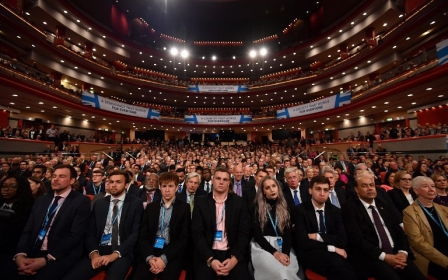Tory Islamophobia is rampant and the party is in denial

The British Conservative Party has a problem with Islamophobia, yet there seems to be little movement on addressing it.
In fact, if anything, it seems to be becoming more severe. A recent poll of party members conducted for the group Hope Not Hate found a remarkable degree of Islamophobia, with 67 percent stating that “there are areas in Britain that operate under Sharia law”, and 45 percent agreeing that “there are areas in Britain in which non-Muslims are not able to enter”.
In addition, 39 percent said they believed that “Islamist terrorists reflect a widespread hostility to Britain among the Muslim community”. The vast majority said they did not feel there was a problem with Islamophobia within the party, with three-quarters stating the party was “doing all it reasonably can” to combat Islamophobia and other forms of racism.
In the last few days, the Muslim Council of Britain has carried its own review into Islamophobia in the media. The most significant finding is that the industry average for negative news relating to Muslims in the media is 59 per cent based on an assessment of over 10,000 articles. Newspapers, such as the Mail on Sunday, are the most likely to publish Islamophobic stories.
Vehement resistance
There are four primary reasons for this vehement resistance to the concept, and with the race to become Britain’s next prime minister reduced to two candidates, the need to understand the problems and determine a range of solutions is more pressing than ever.
Firstly, there is a view that Islamophobia is a ruse to limit free speech - that Muslims advocating the need to fight Islamophobia do so because they wish to silence moderates, liberals or reformists.
This is a duplicitous argument: the vast majority of Muslim groups are progressive. While there are numerous issues regarding development and education in the Muslim world, this is a reality of its recent colonised past, not an indication of the potential for reform.
Secondly, there is a belief that Islamophobia is not the all-pervasive evil it is described as by those fighting it. Detractors try to refute the idea of Islamophobia as racism by suggesting that Islam is not a race. This is to misunderstand racism: Islamophobia reflects the wider historical, institutional and cultural processes that have deep tentacles in the workings of society as a whole. Those who benefit from racism often fail to recognise it.
Thirdly, there is a contention that the drive to thrust Islamophobia to the fore is an attempt to define a normative Islam (mainstream Islam): one that is hardline, narrow, rigid or doctrinal. This is to misunderstand Islam and Muslims.
Activist groups such as MEND and CAGE are committed to fighting Islamophobia and hate crimes, no different from the workings of the Community Safety Trust, which monitors antisemitism. Muslims of all hues and distinctions are speaking out against Islamophobia, not merely those deemed as hardline - and therefore potentially problematic - in the eyes of certain political elites.
Witch hunts
Fourthly, there is a view that this new normative Islam has no nuance in relation to various issues, from animal rights to LGBTQ education. The reality is that these are specific issues within specific contexts, and should be addressed as such.
The denial of Islamophobia is a disavowal of racism, which always finds a way of reinventing itself
Cases such as the "Trojan Horse plot" in Birmingham or the Luftur Rahman saga in Tower Hamlets - one concerning an “Islamic takeover of schools" and the other involving Britain’s first directly elected Muslim mayor - have ultimately amounted to witch hunts, aiming to delegitimise Muslim power for fear of what it may achieve.
Meanwhile, racist comments by Tory MPs and councillors continue to go unaddressed, granting legitimacy to those who utter them. In this context, there are clear signs that matters could get a lot worse before they improve, especially as the current leadership contest reveals an intellectual and political shallowness unprecedented in recent British history.
Uses of Islamophobia
Islamophobia is rooted in racism. The denial of Islamophobia is a disavowal of racism, which always finds a way of reinventing itself.
The reality is that the Tory government is loath to legislate against Islamophobia because, unfortunately, it benefits from it at a variety of levels, from holding onto potential voters in certain areas, to legitimising an interventionist foreign policy that especially affects the Muslim world, to suppressing legitimate dissent and taking attention away from Muslim suffering.
Moving forward, an independent inquiry into Islamophobia in the Conservative Party is an absolute must. This is a persistent problem that needs urgent attention, including an agreed-upon definition not just of the concept of Islamophobia, but of its implications for society as a whole.
While it is true that the party base is overwhelmingly white, middle-aged, middle-class and middle-income, for a prime minister and a party to reflect the interests of the nation, it must be inclusive. With all the vicissitudes of Brexit, widening inequality and political polarisation, there is simply no room for denial any longer.
The views expressed in this article belong to the author and do not necessarily reflect the editorial policy of Middle East Eye.
Middle East Eye propose une couverture et une analyse indépendantes et incomparables du Moyen-Orient, de l’Afrique du Nord et d’autres régions du monde. Pour en savoir plus sur la reprise de ce contenu et les frais qui s’appliquent, veuillez remplir ce formulaire [en anglais]. Pour en savoir plus sur MEE, cliquez ici [en anglais].







